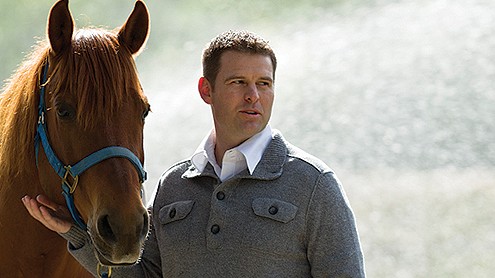Horse power: Platinum Performance taps equine and human markets

Mark Herthel, president of Buellton-based Platinum Performance, founded the equine nutrition company with his veterinarian father, Doug Herthel. (courtesy photo).
Mark Herthel could have gone to veterinary school and followed his father’s distinguished career in equine medicine, but he wanted to be a businessman. So he went to school to study agriculture and food science and turned a startup equine nutrition company into a multimillion-dollar business.
Buellton-based Platinum Performance sells to some of the biggest names in the horse world. Professional rodeo horses, prize-winning racehorses, world-class dressage steeds — and even a few Olympic human athletes — use its products.
“We’ve got everything from the family pony to the Kentucky Derby racehorse,” said Herthel, president of Platinum Performance. A 2002 Cal Poly San Luis Obispo graduate, Herthel launched the business with his father, the chief veterinarian at the world-class Alamo Pintado Equine Medical Center in Los Olivos.
Doug Herthel is known in the horse world as an innovator in equine stem cell research. Fifteen years ago, he was the first vet to inject bone-marrow derived stem cells into horses as a treatment for orthopedic injuries and ailments.
Soon after, Doug Herthel developed a nutritional formula that could be fed to horses as a dietary supplement to speed up healing in bone and soft tissue after orthopedic surgery.
His son saw a business opportunity, and decided to use that flagship product to launch Platinum Performance. At Cal Poly, he studied agricultural business and food science, wrote up a business and marketing plan and set up a makeshift office in his garage.
Today, the company has about a dozen product lines to boost joint, metabolic, immune, and skin and coat health, as well as athletic and breeding performance. The company also has a selection of dog and cat supplements, and launched a line of supplements for humans — more on that later.
Herthel declined to provide a revenue figure, but said the company surpassed the $8 million annual sales mark years ago.
In March, Platinum Performance moved into a new, 43,000-square-foot facility in Buellton, where product is made and shipped to clients and vet clinics around the world.
Herthel has continued to work closely with his father over the years — the Alamo Pintado center serves as a testing ground. “When there’s a clinical need, we try to find solutions for veterinarians,” Herthel said. “We do all of our own research. That’s how we stay competitive.”
In Buellton, a staff of about 40 employees takes orders over the phone, consults with clinics and horse barns, tests out new products and runs the distribution center that sends orders to the western half of the United States. A distribution center in Memphis, Tenn., distributes to the other side of the country.
Platinum Performance will continue to build out the custom-built Buellton space over the next six months, Herthel said, adding more processing rooms as needed. “Knock on wood — I do that every day — but we’ve grown every year,” he said.
The firm’s growth received a big boost from some big-name endorsements over the years. Mine That Bird, a longshot racehorse who catapulted to a win in the 2009 Kentucky Derby, used Platinum Performance. So does Olympic gold showjumper Will Simpson of Thousand Oaks. In fact, Platinum Performance has managed to build up an impressive roster of four-legged athletes as its clients.
But perhaps the biggest buzz surrounding the company came during the 2000 Olympic trials, when media outlets picked up on the news that UC Berkeley swim coach Mike Bottom used the Platinum Performance human line, reformulated for people, in his team’s diet.
Gary Hall, a U.S. Olympic swimmer, wrote about his experience with the nutritional supplements on his Olympic Diary blog on CNN’s Sports Illustrated website.
After being diagnosed with diabetes after the 1996 Olympics, Hall was put on Platinum Performance by Bottom, his coach. “It was the season that would decide the fate of my swimming career. I was having trouble balancing my training and nutrition,” Hall wrote on his blog.
Bottom approached Hall with the Platinum bars, and he agreed to give them a try. “The results speak for themselves,” Hall wrote. “With dietary supplementation I have managed my diabetes and have continued to excel in the sport of swimming, going faster than I had ever been before. I was impressed. I won’t say that this is the only reason that I was able to accomplish so much. It did, however, allow me to train for longer periods of time, at higher intensity.”
Herthel said he couldn’t have asked for better marketing than that. “You had all these headlines saying these guys were using ‘horse bars,’ ” he said.
• Contact Marlize van Romburgh at [email protected].











